Leadership and Management Strategies: UK University Report
VerifiedAdded on 2023/01/17
|17
|3920
|80
Report
AI Summary
This report provides a comprehensive analysis of leadership and management strategies implemented within the educational field, with a specific focus on Bournemouth University in the UK. It delves into three key theories: power and influence, behavioral, and transactional leadership, evaluating their application in motivating students and enhancing their performance. The study critically reviews the instigation, application, and implementation of these theories, considering the situational demands of educational organizations. It also discusses quality procedures for improving leadership styles and offers conclusions and recommendations. The report highlights the importance of effective leadership in fostering a positive and motivating culture, emphasizing the impact of leadership on student personality development and learning outcomes. The analysis includes various leadership powers, behavioral aspects, and the use of rewards and punishments to engage students and improve their skills. It emphasizes the importance of team building, ethical considerations, and interactive sessions to enhance communication and social skills. The report concludes with a reflection on the strategies, emphasizing the need for a systematic and disciplined approach to leadership, the importance of team spirit, and the significance of quality procedures for obtaining optimal results.
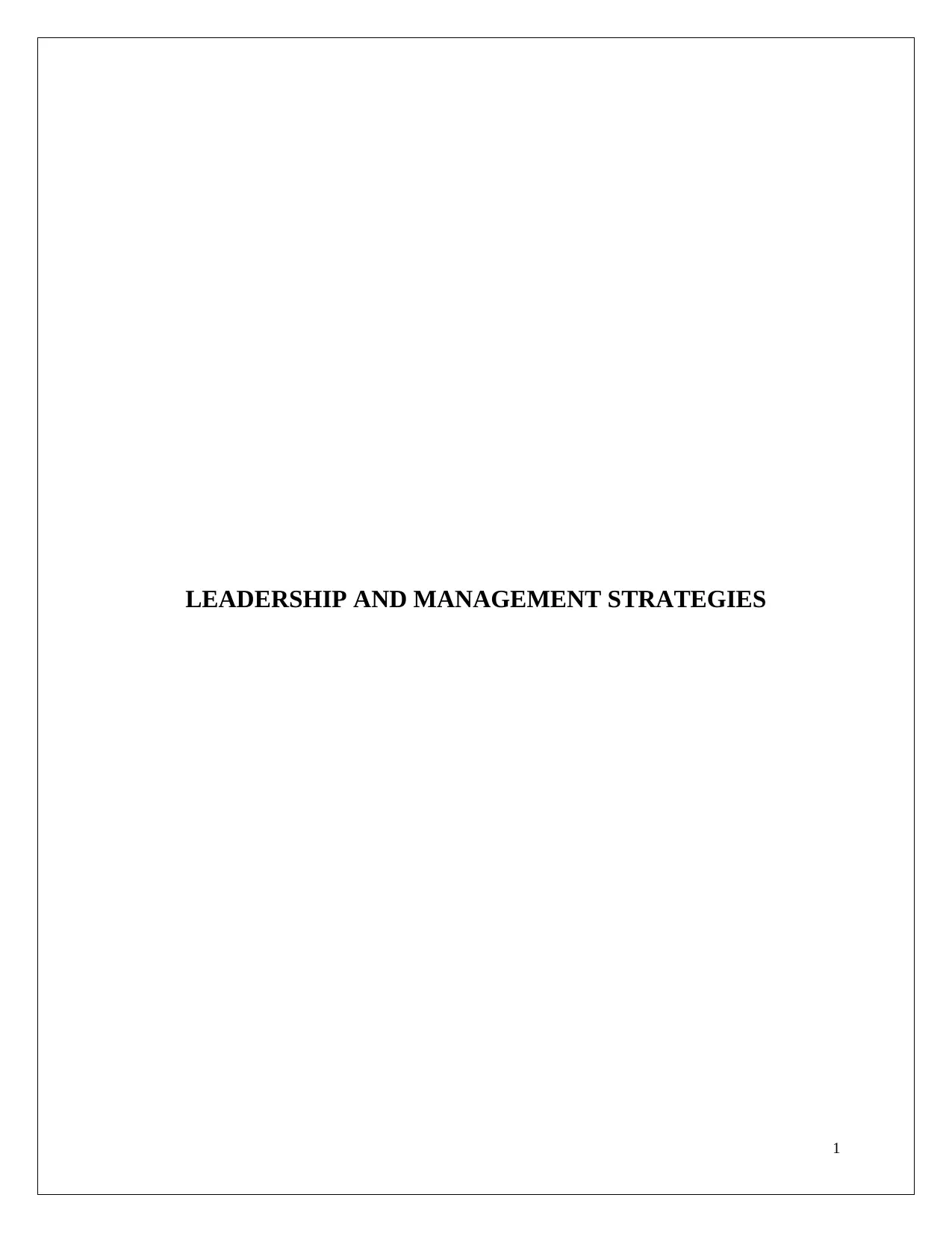
LEADERSHIP AND MANAGEMENT STRATEGIES
1
1
Paraphrase This Document
Need a fresh take? Get an instant paraphrase of this document with our AI Paraphraser
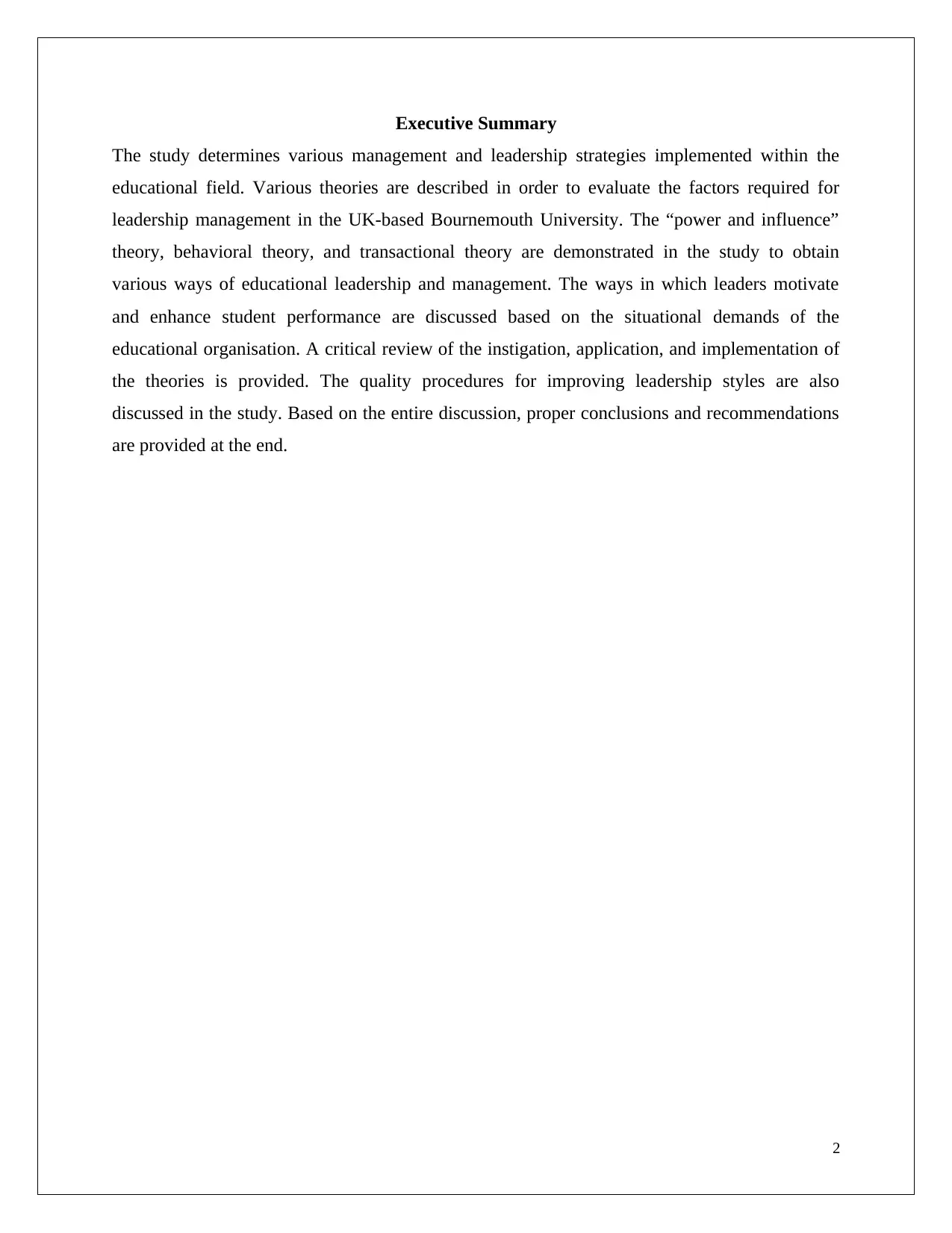
Executive Summary
The study determines various management and leadership strategies implemented within the
educational field. Various theories are described in order to evaluate the factors required for
leadership management in the UK-based Bournemouth University. The “power and influence”
theory, behavioral theory, and transactional theory are demonstrated in the study to obtain
various ways of educational leadership and management. The ways in which leaders motivate
and enhance student performance are discussed based on the situational demands of the
educational organisation. A critical review of the instigation, application, and implementation of
the theories is provided. The quality procedures for improving leadership styles are also
discussed in the study. Based on the entire discussion, proper conclusions and recommendations
are provided at the end.
2
The study determines various management and leadership strategies implemented within the
educational field. Various theories are described in order to evaluate the factors required for
leadership management in the UK-based Bournemouth University. The “power and influence”
theory, behavioral theory, and transactional theory are demonstrated in the study to obtain
various ways of educational leadership and management. The ways in which leaders motivate
and enhance student performance are discussed based on the situational demands of the
educational organisation. A critical review of the instigation, application, and implementation of
the theories is provided. The quality procedures for improving leadership styles are also
discussed in the study. Based on the entire discussion, proper conclusions and recommendations
are provided at the end.
2
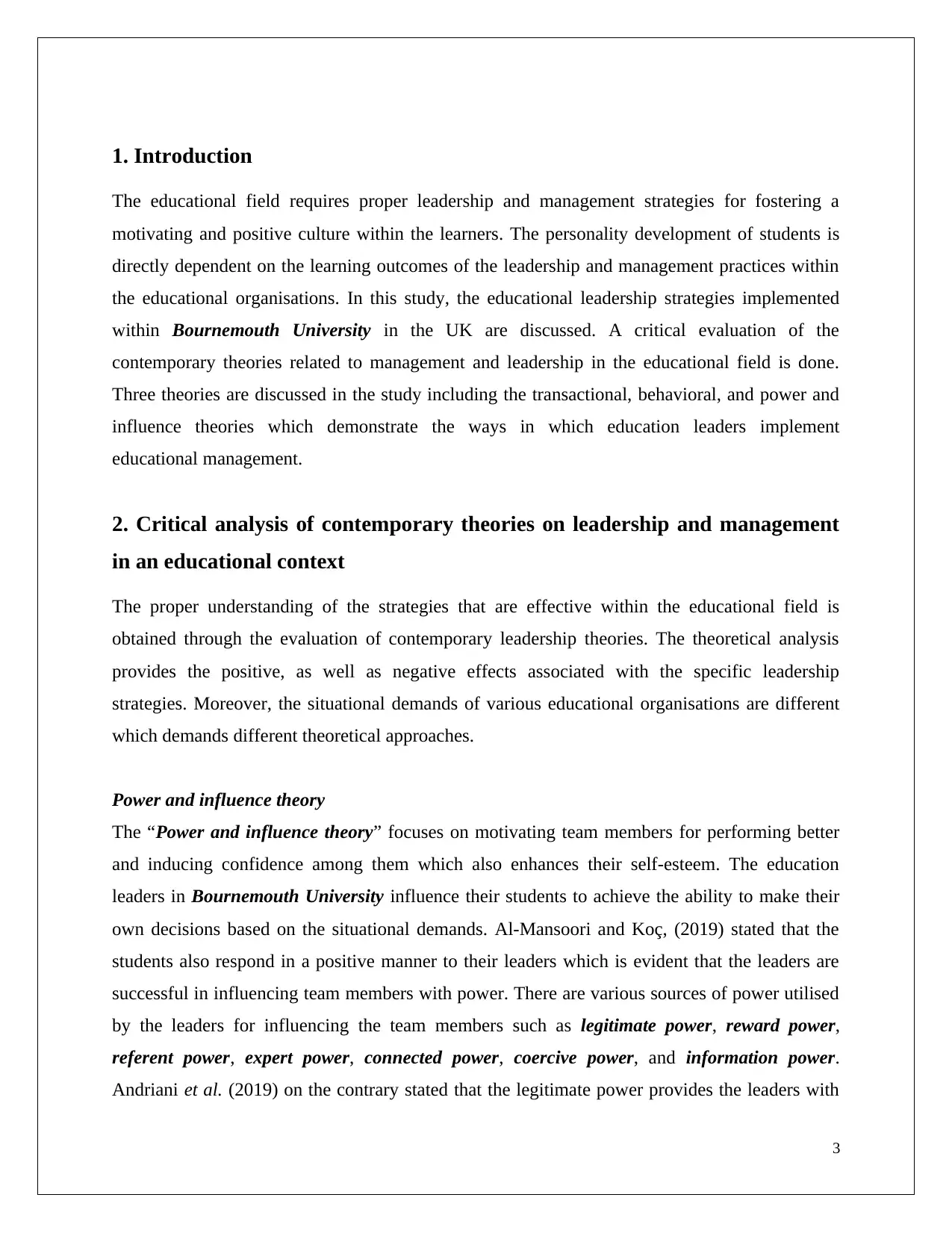
1. Introduction
The educational field requires proper leadership and management strategies for fostering a
motivating and positive culture within the learners. The personality development of students is
directly dependent on the learning outcomes of the leadership and management practices within
the educational organisations. In this study, the educational leadership strategies implemented
within Bournemouth University in the UK are discussed. A critical evaluation of the
contemporary theories related to management and leadership in the educational field is done.
Three theories are discussed in the study including the transactional, behavioral, and power and
influence theories which demonstrate the ways in which education leaders implement
educational management.
2. Critical analysis of contemporary theories on leadership and management
in an educational context
The proper understanding of the strategies that are effective within the educational field is
obtained through the evaluation of contemporary leadership theories. The theoretical analysis
provides the positive, as well as negative effects associated with the specific leadership
strategies. Moreover, the situational demands of various educational organisations are different
which demands different theoretical approaches.
Power and influence theory
The “Power and influence theory” focuses on motivating team members for performing better
and inducing confidence among them which also enhances their self-esteem. The education
leaders in Bournemouth University influence their students to achieve the ability to make their
own decisions based on the situational demands. Al-Mansoori and Koç, (2019) stated that the
students also respond in a positive manner to their leaders which is evident that the leaders are
successful in influencing team members with power. There are various sources of power utilised
by the leaders for influencing the team members such as legitimate power, reward power,
referent power, expert power, connected power, coercive power, and information power.
Andriani et al. (2019) on the contrary stated that the legitimate power provides the leaders with
3
The educational field requires proper leadership and management strategies for fostering a
motivating and positive culture within the learners. The personality development of students is
directly dependent on the learning outcomes of the leadership and management practices within
the educational organisations. In this study, the educational leadership strategies implemented
within Bournemouth University in the UK are discussed. A critical evaluation of the
contemporary theories related to management and leadership in the educational field is done.
Three theories are discussed in the study including the transactional, behavioral, and power and
influence theories which demonstrate the ways in which education leaders implement
educational management.
2. Critical analysis of contemporary theories on leadership and management
in an educational context
The proper understanding of the strategies that are effective within the educational field is
obtained through the evaluation of contemporary leadership theories. The theoretical analysis
provides the positive, as well as negative effects associated with the specific leadership
strategies. Moreover, the situational demands of various educational organisations are different
which demands different theoretical approaches.
Power and influence theory
The “Power and influence theory” focuses on motivating team members for performing better
and inducing confidence among them which also enhances their self-esteem. The education
leaders in Bournemouth University influence their students to achieve the ability to make their
own decisions based on the situational demands. Al-Mansoori and Koç, (2019) stated that the
students also respond in a positive manner to their leaders which is evident that the leaders are
successful in influencing team members with power. There are various sources of power utilised
by the leaders for influencing the team members such as legitimate power, reward power,
referent power, expert power, connected power, coercive power, and information power.
Andriani et al. (2019) on the contrary stated that the legitimate power provides the leaders with
3
⊘ This is a preview!⊘
Do you want full access?
Subscribe today to unlock all pages.

Trusted by 1+ million students worldwide
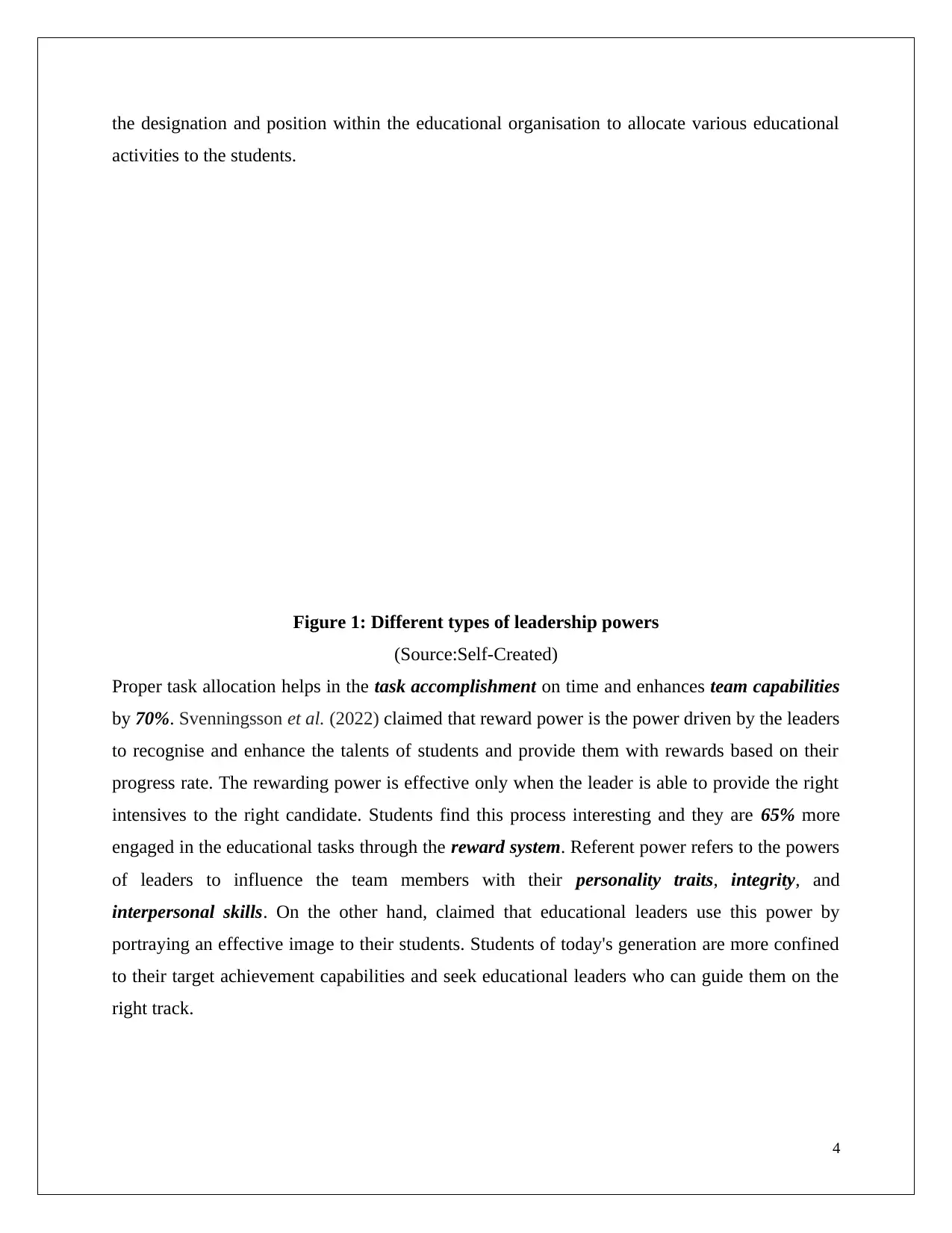
the designation and position within the educational organisation to allocate various educational
activities to the students.
Figure 1: Different types of leadership powers
(Source:Self-Created)
Proper task allocation helps in the task accomplishment on time and enhances team capabilities
by 70%. Svenningsson et al. (2022) claimed that reward power is the power driven by the leaders
to recognise and enhance the talents of students and provide them with rewards based on their
progress rate. The rewarding power is effective only when the leader is able to provide the right
intensives to the right candidate. Students find this process interesting and they are 65% more
engaged in the educational tasks through the reward system. Referent power refers to the powers
of leaders to influence the team members with their personality traits, integrity, and
interpersonal skills. On the other hand, claimed that educational leaders use this power by
portraying an effective image to their students. Students of today's generation are more confined
to their target achievement capabilities and seek educational leaders who can guide them on the
right track.
4
LegitimatepowerRewardpowerReferentpowerExpertpowerConnectedpowerCoercivepower
activities to the students.
Figure 1: Different types of leadership powers
(Source:Self-Created)
Proper task allocation helps in the task accomplishment on time and enhances team capabilities
by 70%. Svenningsson et al. (2022) claimed that reward power is the power driven by the leaders
to recognise and enhance the talents of students and provide them with rewards based on their
progress rate. The rewarding power is effective only when the leader is able to provide the right
intensives to the right candidate. Students find this process interesting and they are 65% more
engaged in the educational tasks through the reward system. Referent power refers to the powers
of leaders to influence the team members with their personality traits, integrity, and
interpersonal skills. On the other hand, claimed that educational leaders use this power by
portraying an effective image to their students. Students of today's generation are more confined
to their target achievement capabilities and seek educational leaders who can guide them on the
right track.
4
LegitimatepowerRewardpowerReferentpowerExpertpowerConnectedpowerCoercivepower
Paraphrase This Document
Need a fresh take? Get an instant paraphrase of this document with our AI Paraphraser
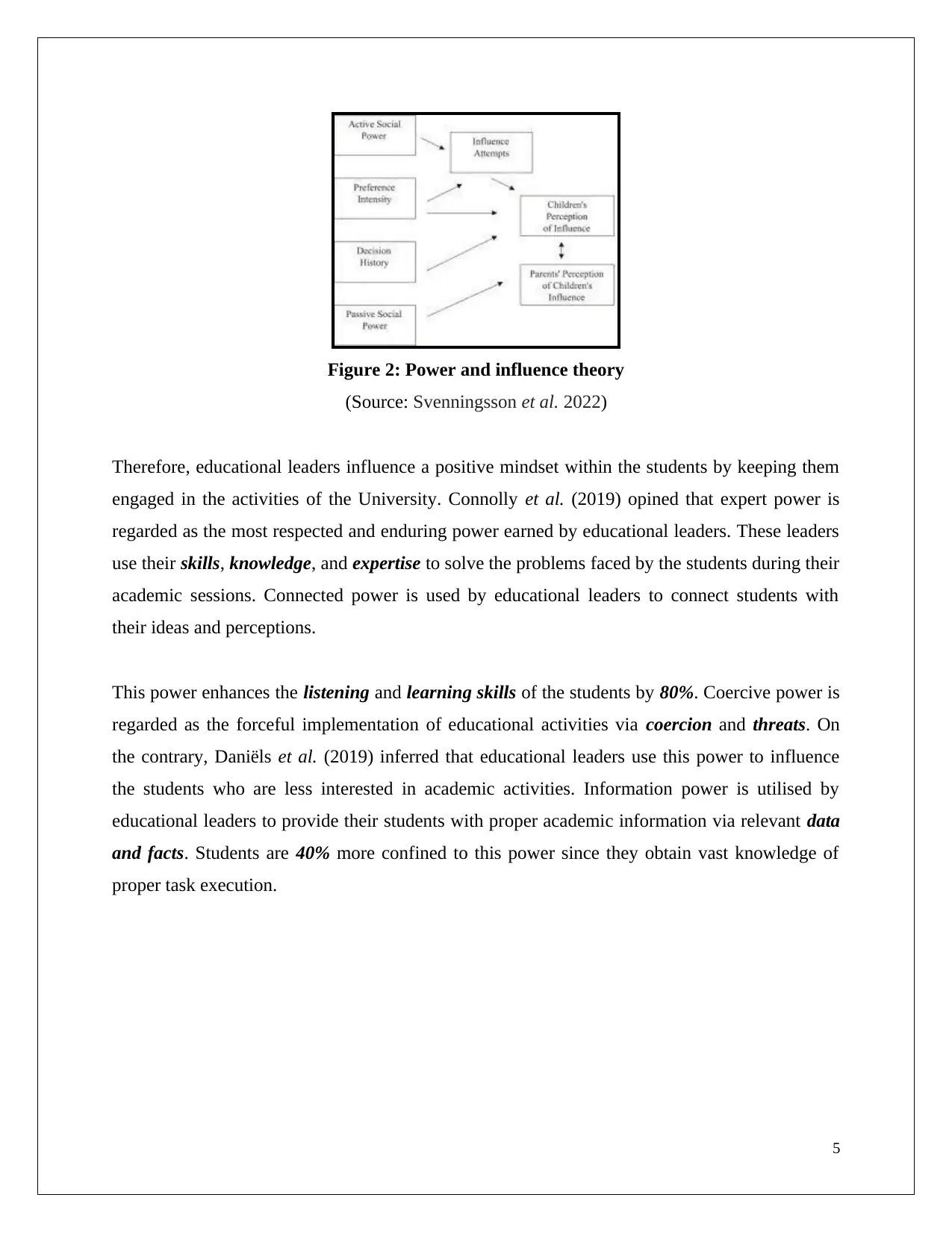
Figure 2: Power and influence theory
(Source: Svenningsson et al. 2022)
Therefore, educational leaders influence a positive mindset within the students by keeping them
engaged in the activities of the University. Connolly et al. (2019) opined that expert power is
regarded as the most respected and enduring power earned by educational leaders. These leaders
use their skills, knowledge, and expertise to solve the problems faced by the students during their
academic sessions. Connected power is used by educational leaders to connect students with
their ideas and perceptions.
This power enhances the listening and learning skills of the students by 80%. Coercive power is
regarded as the forceful implementation of educational activities via coercion and threats. On
the contrary, Daniëls et al. (2019) inferred that educational leaders use this power to influence
the students who are less interested in academic activities. Information power is utilised by
educational leaders to provide their students with proper academic information via relevant data
and facts. Students are 40% more confined to this power since they obtain vast knowledge of
proper task execution.
5
(Source: Svenningsson et al. 2022)
Therefore, educational leaders influence a positive mindset within the students by keeping them
engaged in the activities of the University. Connolly et al. (2019) opined that expert power is
regarded as the most respected and enduring power earned by educational leaders. These leaders
use their skills, knowledge, and expertise to solve the problems faced by the students during their
academic sessions. Connected power is used by educational leaders to connect students with
their ideas and perceptions.
This power enhances the listening and learning skills of the students by 80%. Coercive power is
regarded as the forceful implementation of educational activities via coercion and threats. On
the contrary, Daniëls et al. (2019) inferred that educational leaders use this power to influence
the students who are less interested in academic activities. Information power is utilised by
educational leaders to provide their students with proper academic information via relevant data
and facts. Students are 40% more confined to this power since they obtain vast knowledge of
proper task execution.
5
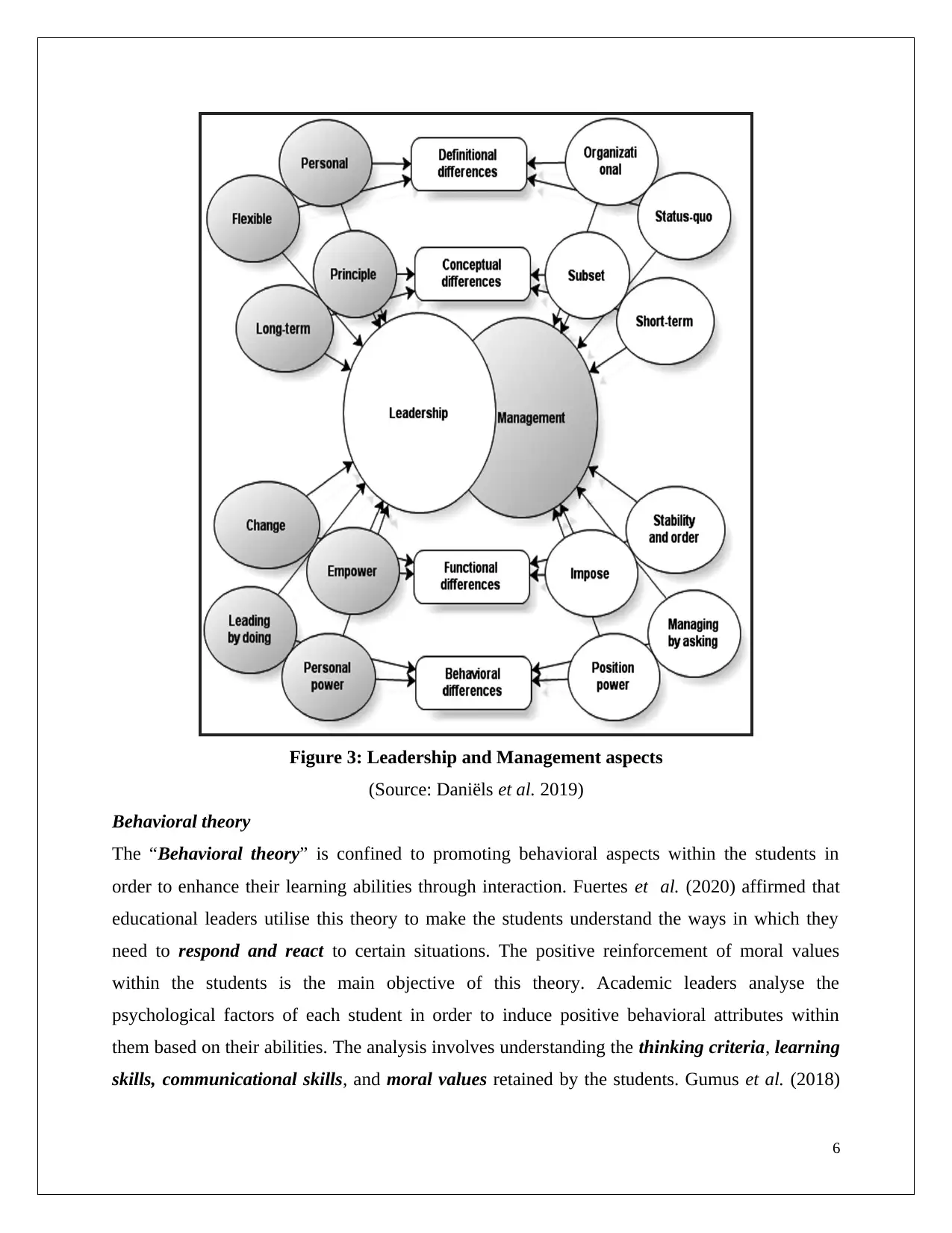
Figure 3: Leadership and Management aspects
(Source: Daniëls et al. 2019)
Behavioral theory
The “Behavioral theory” is confined to promoting behavioral aspects within the students in
order to enhance their learning abilities through interaction. Fuertes et al. (2020) affirmed that
educational leaders utilise this theory to make the students understand the ways in which they
need to respond and react to certain situations. The positive reinforcement of moral values
within the students is the main objective of this theory. Academic leaders analyse the
psychological factors of each student in order to induce positive behavioral attributes within
them based on their abilities. The analysis involves understanding the thinking criteria, learning
skills, communicational skills, and moral values retained by the students. Gumus et al. (2018)
6
(Source: Daniëls et al. 2019)
Behavioral theory
The “Behavioral theory” is confined to promoting behavioral aspects within the students in
order to enhance their learning abilities through interaction. Fuertes et al. (2020) affirmed that
educational leaders utilise this theory to make the students understand the ways in which they
need to respond and react to certain situations. The positive reinforcement of moral values
within the students is the main objective of this theory. Academic leaders analyse the
psychological factors of each student in order to induce positive behavioral attributes within
them based on their abilities. The analysis involves understanding the thinking criteria, learning
skills, communicational skills, and moral values retained by the students. Gumus et al. (2018)
6
⊘ This is a preview!⊘
Do you want full access?
Subscribe today to unlock all pages.

Trusted by 1+ million students worldwide
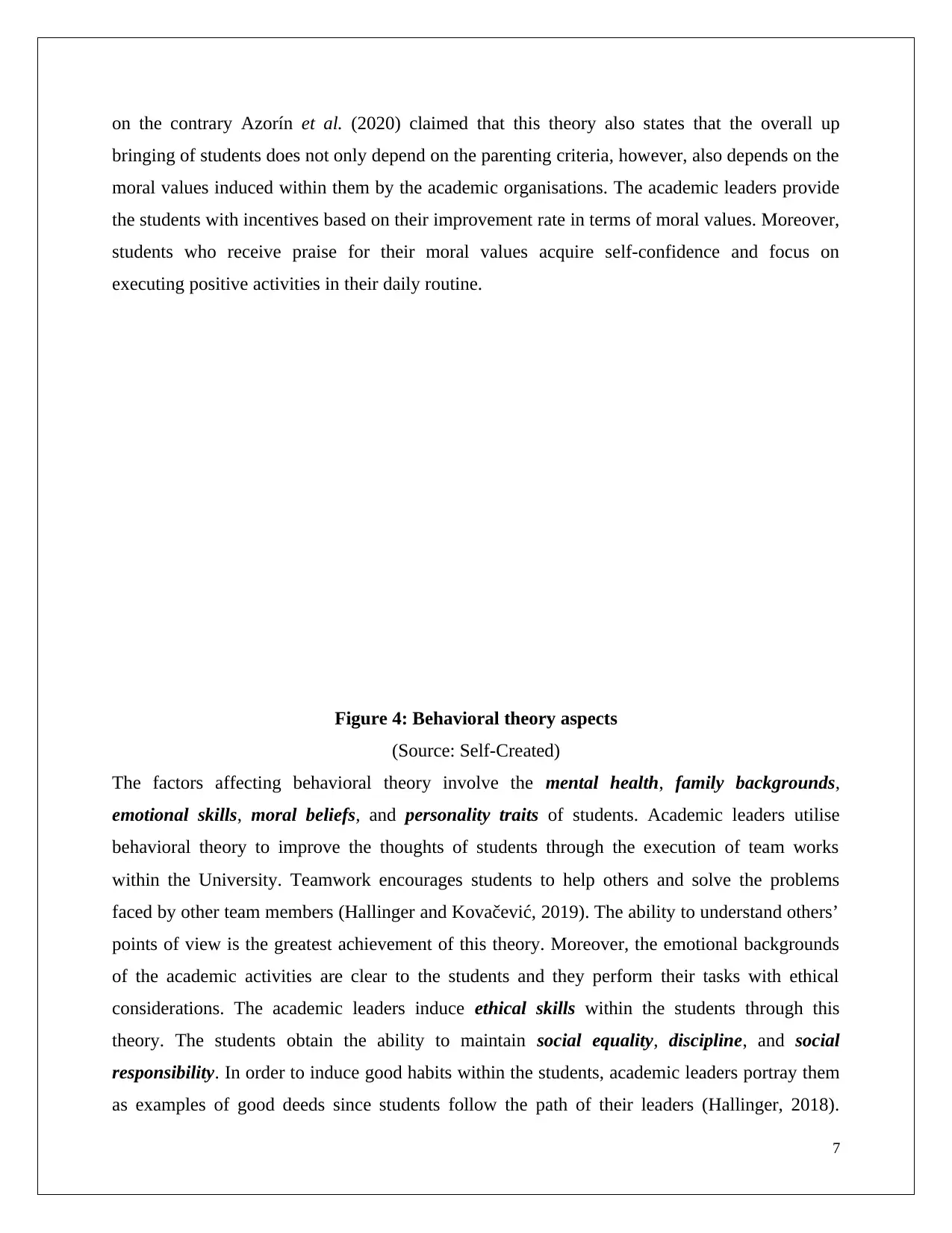
on the contrary Azorín et al. (2020) claimed that this theory also states that the overall up
bringing of students does not only depend on the parenting criteria, however, also depends on the
moral values induced within them by the academic organisations. The academic leaders provide
the students with incentives based on their improvement rate in terms of moral values. Moreover,
students who receive praise for their moral values acquire self-confidence and focus on
executing positive activities in their daily routine.
Figure 4: Behavioral theory aspects
(Source: Self-Created)
The factors affecting behavioral theory involve the mental health, family backgrounds,
emotional skills, moral beliefs, and personality traits of students. Academic leaders utilise
behavioral theory to improve the thoughts of students through the execution of team works
within the University. Teamwork encourages students to help others and solve the problems
faced by other team members (Hallinger and Kovačević, 2019). The ability to understand others’
points of view is the greatest achievement of this theory. Moreover, the emotional backgrounds
of the academic activities are clear to the students and they perform their tasks with ethical
considerations. The academic leaders induce ethical skills within the students through this
theory. The students obtain the ability to maintain social equality, discipline, and social
responsibility. In order to induce good habits within the students, academic leaders portray them
as examples of good deeds since students follow the path of their leaders (Hallinger, 2018).
7
PercievedbehabioralcontrolSubjectivebehavioralnormsInducemoralcultureSocialandculturalawarenessControlbeliefs
bringing of students does not only depend on the parenting criteria, however, also depends on the
moral values induced within them by the academic organisations. The academic leaders provide
the students with incentives based on their improvement rate in terms of moral values. Moreover,
students who receive praise for their moral values acquire self-confidence and focus on
executing positive activities in their daily routine.
Figure 4: Behavioral theory aspects
(Source: Self-Created)
The factors affecting behavioral theory involve the mental health, family backgrounds,
emotional skills, moral beliefs, and personality traits of students. Academic leaders utilise
behavioral theory to improve the thoughts of students through the execution of team works
within the University. Teamwork encourages students to help others and solve the problems
faced by other team members (Hallinger and Kovačević, 2019). The ability to understand others’
points of view is the greatest achievement of this theory. Moreover, the emotional backgrounds
of the academic activities are clear to the students and they perform their tasks with ethical
considerations. The academic leaders induce ethical skills within the students through this
theory. The students obtain the ability to maintain social equality, discipline, and social
responsibility. In order to induce good habits within the students, academic leaders portray them
as examples of good deeds since students follow the path of their leaders (Hallinger, 2018).
7
PercievedbehabioralcontrolSubjectivebehavioralnormsInducemoralcultureSocialandculturalawarenessControlbeliefs
Paraphrase This Document
Need a fresh take? Get an instant paraphrase of this document with our AI Paraphraser
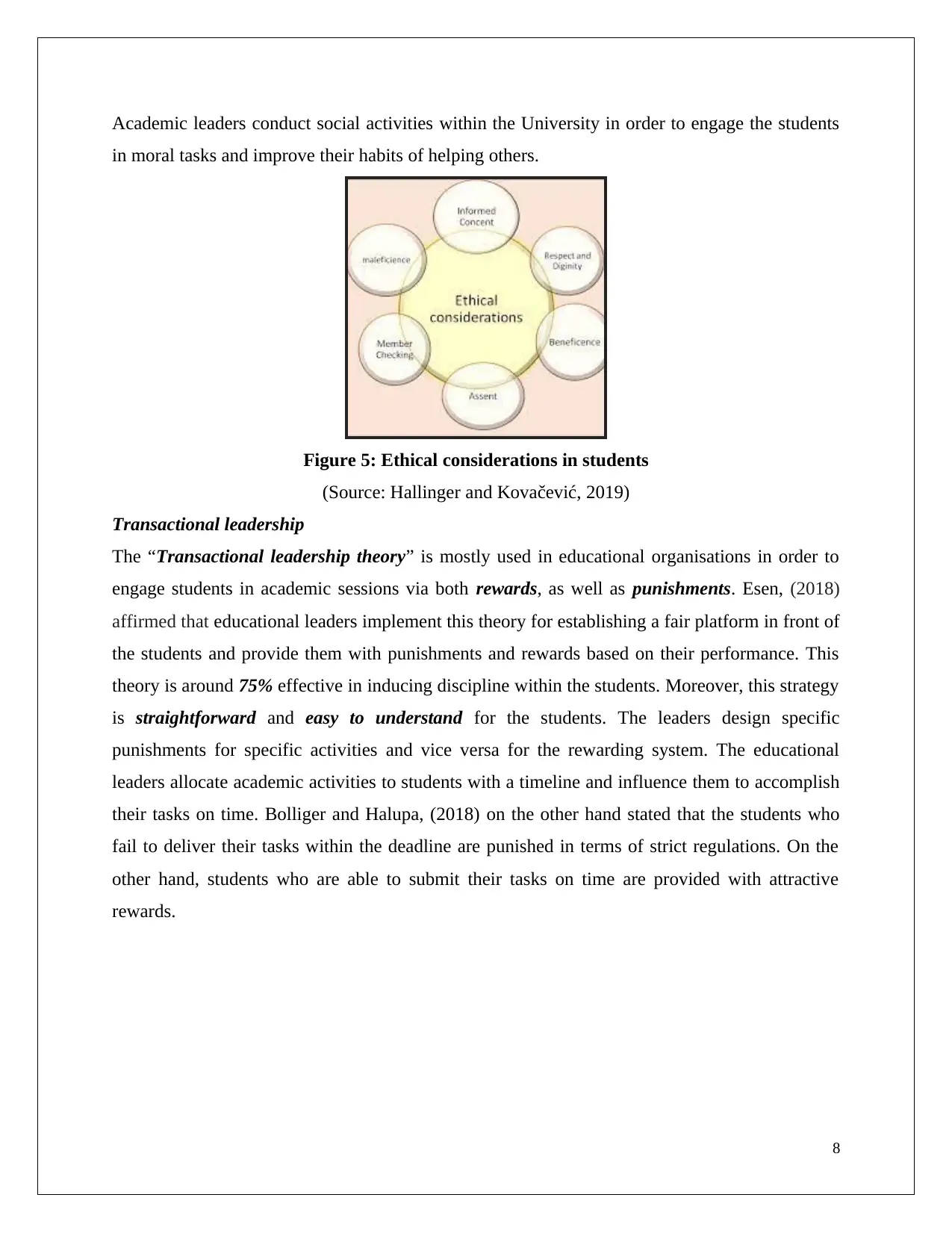
Academic leaders conduct social activities within the University in order to engage the students
in moral tasks and improve their habits of helping others.
Figure 5: Ethical considerations in students
(Source: Hallinger and Kovačević, 2019)
Transactional leadership
The “Transactional leadership theory” is mostly used in educational organisations in order to
engage students in academic sessions via both rewards, as well as punishments. Esen, (2018)
affirmed that educational leaders implement this theory for establishing a fair platform in front of
the students and provide them with punishments and rewards based on their performance. This
theory is around 75% effective in inducing discipline within the students. Moreover, this strategy
is straightforward and easy to understand for the students. The leaders design specific
punishments for specific activities and vice versa for the rewarding system. The educational
leaders allocate academic activities to students with a timeline and influence them to accomplish
their tasks on time. Bolliger and Halupa, (2018) on the other hand stated that the students who
fail to deliver their tasks within the deadline are punished in terms of strict regulations. On the
other hand, students who are able to submit their tasks on time are provided with attractive
rewards.
8
in moral tasks and improve their habits of helping others.
Figure 5: Ethical considerations in students
(Source: Hallinger and Kovačević, 2019)
Transactional leadership
The “Transactional leadership theory” is mostly used in educational organisations in order to
engage students in academic sessions via both rewards, as well as punishments. Esen, (2018)
affirmed that educational leaders implement this theory for establishing a fair platform in front of
the students and provide them with punishments and rewards based on their performance. This
theory is around 75% effective in inducing discipline within the students. Moreover, this strategy
is straightforward and easy to understand for the students. The leaders design specific
punishments for specific activities and vice versa for the rewarding system. The educational
leaders allocate academic activities to students with a timeline and influence them to accomplish
their tasks on time. Bolliger and Halupa, (2018) on the other hand stated that the students who
fail to deliver their tasks within the deadline are punished in terms of strict regulations. On the
other hand, students who are able to submit their tasks on time are provided with attractive
rewards.
8
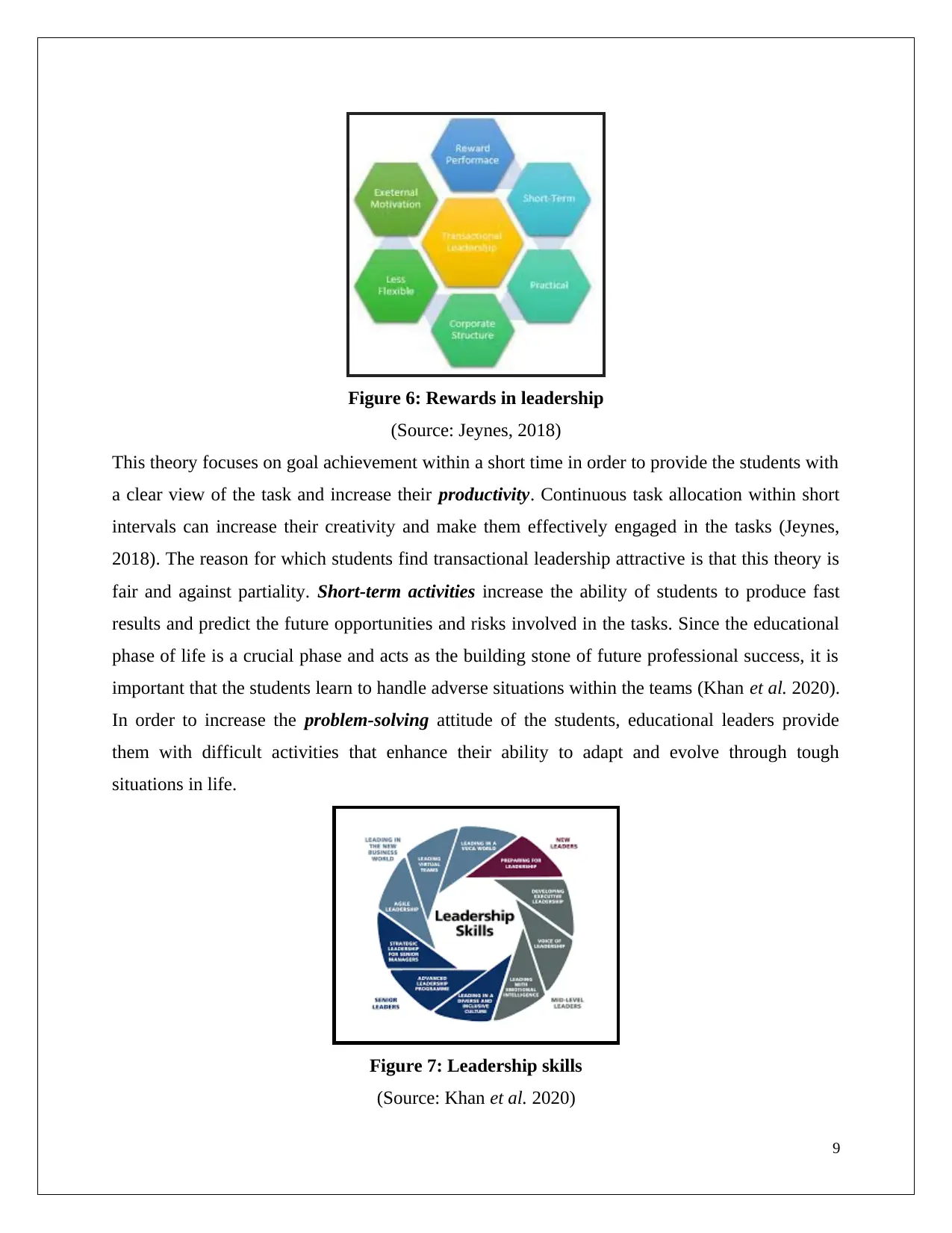
Figure 6: Rewards in leadership
(Source: Jeynes, 2018)
This theory focuses on goal achievement within a short time in order to provide the students with
a clear view of the task and increase their productivity. Continuous task allocation within short
intervals can increase their creativity and make them effectively engaged in the tasks (Jeynes,
2018). The reason for which students find transactional leadership attractive is that this theory is
fair and against partiality. Short-term activities increase the ability of students to produce fast
results and predict the future opportunities and risks involved in the tasks. Since the educational
phase of life is a crucial phase and acts as the building stone of future professional success, it is
important that the students learn to handle adverse situations within the teams (Khan et al. 2020).
In order to increase the problem-solving attitude of the students, educational leaders provide
them with difficult activities that enhance their ability to adapt and evolve through tough
situations in life.
Figure 7: Leadership skills
(Source: Khan et al. 2020)
9
(Source: Jeynes, 2018)
This theory focuses on goal achievement within a short time in order to provide the students with
a clear view of the task and increase their productivity. Continuous task allocation within short
intervals can increase their creativity and make them effectively engaged in the tasks (Jeynes,
2018). The reason for which students find transactional leadership attractive is that this theory is
fair and against partiality. Short-term activities increase the ability of students to produce fast
results and predict the future opportunities and risks involved in the tasks. Since the educational
phase of life is a crucial phase and acts as the building stone of future professional success, it is
important that the students learn to handle adverse situations within the teams (Khan et al. 2020).
In order to increase the problem-solving attitude of the students, educational leaders provide
them with difficult activities that enhance their ability to adapt and evolve through tough
situations in life.
Figure 7: Leadership skills
(Source: Khan et al. 2020)
9
⊘ This is a preview!⊘
Do you want full access?
Subscribe today to unlock all pages.

Trusted by 1+ million students worldwide
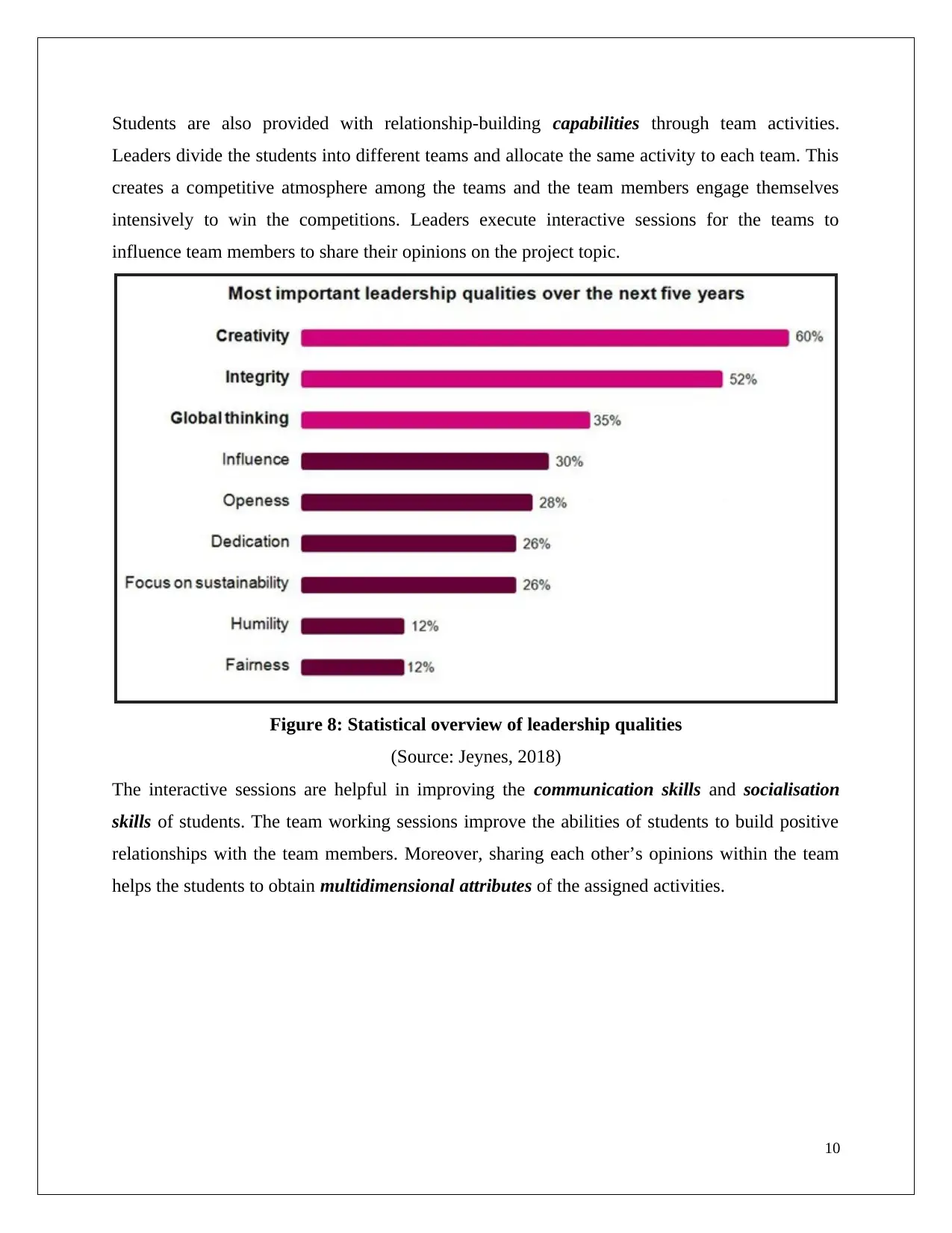
Students are also provided with relationship-building capabilities through team activities.
Leaders divide the students into different teams and allocate the same activity to each team. This
creates a competitive atmosphere among the teams and the team members engage themselves
intensively to win the competitions. Leaders execute interactive sessions for the teams to
influence team members to share their opinions on the project topic.
Figure 8: Statistical overview of leadership qualities
(Source: Jeynes, 2018)
The interactive sessions are helpful in improving the communication skills and socialisation
skills of students. The team working sessions improve the abilities of students to build positive
relationships with the team members. Moreover, sharing each other’s opinions within the team
helps the students to obtain multidimensional attributes of the assigned activities.
10
Leaders divide the students into different teams and allocate the same activity to each team. This
creates a competitive atmosphere among the teams and the team members engage themselves
intensively to win the competitions. Leaders execute interactive sessions for the teams to
influence team members to share their opinions on the project topic.
Figure 8: Statistical overview of leadership qualities
(Source: Jeynes, 2018)
The interactive sessions are helpful in improving the communication skills and socialisation
skills of students. The team working sessions improve the abilities of students to build positive
relationships with the team members. Moreover, sharing each other’s opinions within the team
helps the students to obtain multidimensional attributes of the assigned activities.
10
Paraphrase This Document
Need a fresh take? Get an instant paraphrase of this document with our AI Paraphraser
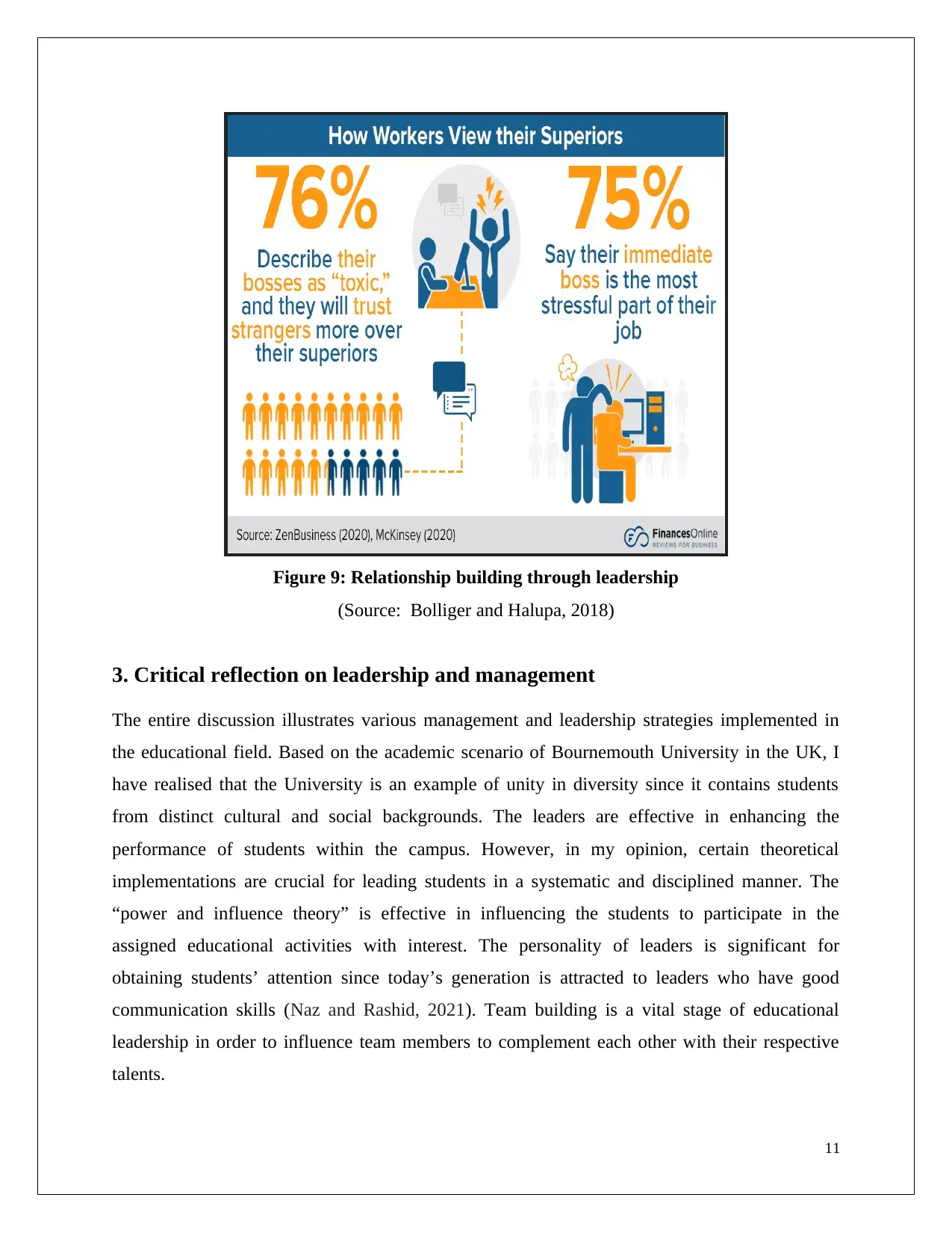
Figure 9: Relationship building through leadership
(Source: Bolliger and Halupa, 2018)
3. Critical reflection on leadership and management
The entire discussion illustrates various management and leadership strategies implemented in
the educational field. Based on the academic scenario of Bournemouth University in the UK, I
have realised that the University is an example of unity in diversity since it contains students
from distinct cultural and social backgrounds. The leaders are effective in enhancing the
performance of students within the campus. However, in my opinion, certain theoretical
implementations are crucial for leading students in a systematic and disciplined manner. The
“power and influence theory” is effective in influencing the students to participate in the
assigned educational activities with interest. The personality of leaders is significant for
obtaining students’ attention since today’s generation is attracted to leaders who have good
communication skills (Naz and Rashid, 2021). Team building is a vital stage of educational
leadership in order to influence team members to complement each other with their respective
talents.
11
(Source: Bolliger and Halupa, 2018)
3. Critical reflection on leadership and management
The entire discussion illustrates various management and leadership strategies implemented in
the educational field. Based on the academic scenario of Bournemouth University in the UK, I
have realised that the University is an example of unity in diversity since it contains students
from distinct cultural and social backgrounds. The leaders are effective in enhancing the
performance of students within the campus. However, in my opinion, certain theoretical
implementations are crucial for leading students in a systematic and disciplined manner. The
“power and influence theory” is effective in influencing the students to participate in the
assigned educational activities with interest. The personality of leaders is significant for
obtaining students’ attention since today’s generation is attracted to leaders who have good
communication skills (Naz and Rashid, 2021). Team building is a vital stage of educational
leadership in order to influence team members to complement each other with their respective
talents.
11
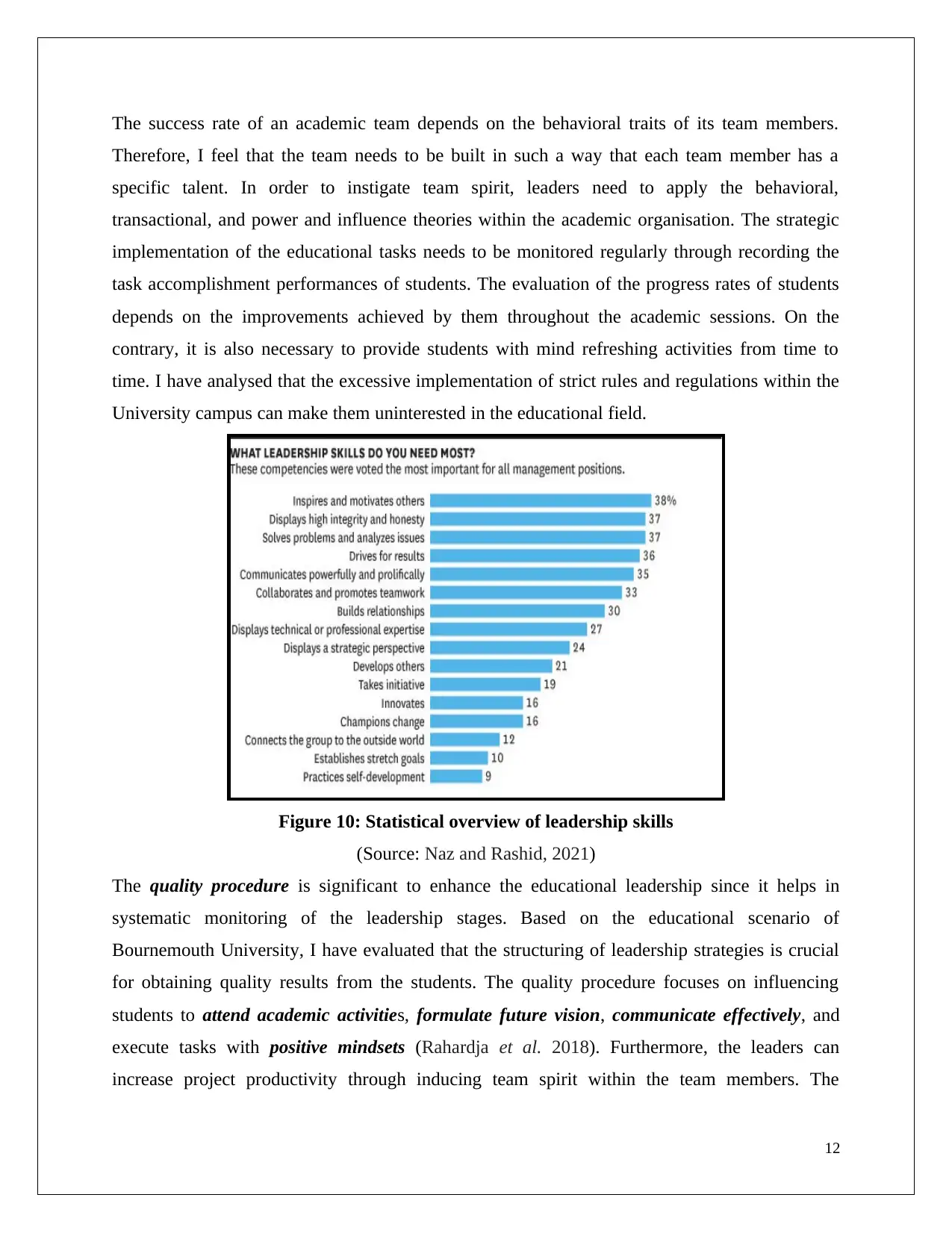
The success rate of an academic team depends on the behavioral traits of its team members.
Therefore, I feel that the team needs to be built in such a way that each team member has a
specific talent. In order to instigate team spirit, leaders need to apply the behavioral,
transactional, and power and influence theories within the academic organisation. The strategic
implementation of the educational tasks needs to be monitored regularly through recording the
task accomplishment performances of students. The evaluation of the progress rates of students
depends on the improvements achieved by them throughout the academic sessions. On the
contrary, it is also necessary to provide students with mind refreshing activities from time to
time. I have analysed that the excessive implementation of strict rules and regulations within the
University campus can make them uninterested in the educational field.
Figure 10: Statistical overview of leadership skills
(Source: Naz and Rashid, 2021)
The quality procedure is significant to enhance the educational leadership since it helps in
systematic monitoring of the leadership stages. Based on the educational scenario of
Bournemouth University, I have evaluated that the structuring of leadership strategies is crucial
for obtaining quality results from the students. The quality procedure focuses on influencing
students to attend academic activities, formulate future vision, communicate effectively, and
execute tasks with positive mindsets (Rahardja et al. 2018). Furthermore, the leaders can
increase project productivity through inducing team spirit within the team members. The
12
Therefore, I feel that the team needs to be built in such a way that each team member has a
specific talent. In order to instigate team spirit, leaders need to apply the behavioral,
transactional, and power and influence theories within the academic organisation. The strategic
implementation of the educational tasks needs to be monitored regularly through recording the
task accomplishment performances of students. The evaluation of the progress rates of students
depends on the improvements achieved by them throughout the academic sessions. On the
contrary, it is also necessary to provide students with mind refreshing activities from time to
time. I have analysed that the excessive implementation of strict rules and regulations within the
University campus can make them uninterested in the educational field.
Figure 10: Statistical overview of leadership skills
(Source: Naz and Rashid, 2021)
The quality procedure is significant to enhance the educational leadership since it helps in
systematic monitoring of the leadership stages. Based on the educational scenario of
Bournemouth University, I have evaluated that the structuring of leadership strategies is crucial
for obtaining quality results from the students. The quality procedure focuses on influencing
students to attend academic activities, formulate future vision, communicate effectively, and
execute tasks with positive mindsets (Rahardja et al. 2018). Furthermore, the leaders can
increase project productivity through inducing team spirit within the team members. The
12
⊘ This is a preview!⊘
Do you want full access?
Subscribe today to unlock all pages.

Trusted by 1+ million students worldwide
1 out of 17
Related Documents
Your All-in-One AI-Powered Toolkit for Academic Success.
+13062052269
info@desklib.com
Available 24*7 on WhatsApp / Email
![[object Object]](/_next/static/media/star-bottom.7253800d.svg)
Unlock your academic potential
Copyright © 2020–2026 A2Z Services. All Rights Reserved. Developed and managed by ZUCOL.





